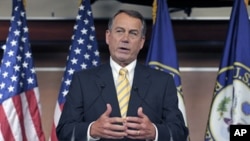Amid the looming threat of a U.S. debt crisis, top lawmakers continue to call for action to solve America's fiscal woes - all the while pointing fingers at opposing political parties and opposing houses of a politically-divided Congress.
Related video report by Jim Randle:
Less than two weeks before the United States risks defaulting on its national debt, the two houses of Congress are each demanding the other enact legislation or proposals unpalatable to a majority of its members.
In the Republican-controlled House of Representatives, Speaker John Boehner urged Senate passage of a bill the House approved earlier this week that links raising the debt ceiling to adoption of Republican fiscal priorities.
"Republicans have laid out a responsible and detailed path forward, and the House has passed it," said Boehner. "The Senate should now pass Cut, Cap, and Balance."
The Cut, Cap, and Balance Act would drastically reduce federal spending and require a constitutional mandate the U.S. government balance its books every year. It would preserve all current tax rates and exemptions.
In the Democratically-controlled Senate, Majority Leader Harry Reid had blunt words.
"The Republicans' so-called Cut, Cap, and Balance plan does not have one chance in a million of passing the Senate," said Reid.
Instead, Reid urged the House to help forge a bipartisan deficit-reduction agreement. "Democrats have shown they are willing to work with Republicans on any serious, reasonable plan that averts default and cuts the deficit in a balanced way," Reid Added. "Now it is time for House Republicans to show they are also willing to get serious."
Earlier this week, three Republican and three Democratic senators - the so-called Gang of Six - issued a bipartisan proposal that was hailed by President Barack Obama as a possible blueprint for a final deal. The plan couples spending cuts and government program reforms sought by Republicans with some additional revenues sought by Democrats.
But the plan has yet to be written up as actual legislation.
House Speaker Boehner points out the Republican plan is the only bill to pass either house of Congress, the only existing legislation that provides a path to avoid a fiscal and financial ruin.
"It is not enough to wish or to wait for a solution to materialize. And whatever you want to call that approach, it certainly is not leadership," Boehner said.
A Senate vote defeating the Cut, Cap, and Balance Act is widely expected in coming days.
In the meantime, Speaker Boehner has canceled a scheduled weekend session for the House of Representatives. That means that the earliest the chamber could begin considering an alternative proposal, if it were inclined to do so, would be next week. Absent a deal by August 2, the United States risks defaulting on its national debt.
Republicans like Speaker Boehner are holding firm to their no-tax pledge, making any bill that would garner Democratic support unlikely to pass the House. "I have never voted to raise taxes, and I do not intend to," Boehner added.
Democrats argue, without new tax revenues, draconian spending cuts would be needed to put the United States on a sustainable fiscal path. They say such cuts would force the federal government to renege on promises made to senior citizens, the unemployed, and the poor and the vulnerable.
The Cut, Cap and Balance Act would limit future federal spending to 18 percent of U.S. economic output.
Democratic Senator Tom Harkin of Iowa made an observation about the significance of that number in relation to Medicare, which pays a portion of retirees' health care bills.
"The last time federal spending was at 18-percent of GDP [gross domestic product] was 1966, before Medicare took hold," Harkin noted.
Fellow-Democratic Senator Barbara Boxer of California used humor to note just how much the nation has changed since 1966. "The number-one song in the country [in 1966] was by The Monkees," said Boxer. "How many of you were born after The Monkees made 'I'm a Believer'?"
Republicans counter that tax hikes would stifle job creation and economic growth, and that additional revenue would only spur more government spending, making America's debt crisis even worse.




